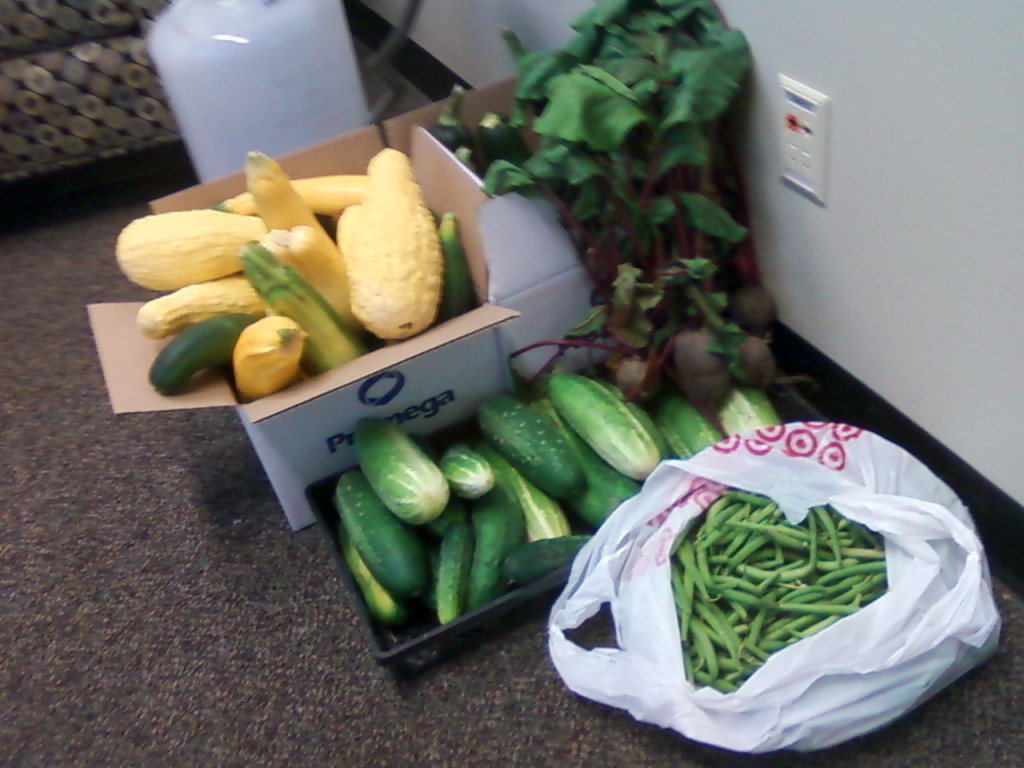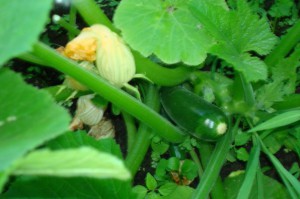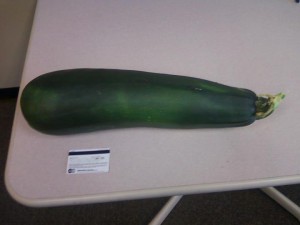How does your garden grow? Well, normally, I would tell you that it doesn’t, not until late May anyway. But this year, the grass is green, the trees are flowering and the garden is already tilled in early April! Unseasonably warm temperatures come with questions: Is this global warming? The 2012 apocalypse? When can I start planting???
I fell in love with vegetable gardening about three years ago when a coworker brought in some extra seedlings. There is nothing like watching food grow up from a mere seed and then harvesting and eating! At Promega, we have some community garden space, which is great since my black walnut tree at home kills all my tomatoes. We are attempting to keep this garden space organic. As a new gardener, I am still learning what this means, so I thought I would share some of my new-found information.
The most basic definition is that when gardening organically means no added chemicals. The word organic brings more questions: What about bugs? What about weeds? I can’t even use fertilizer?? Take a deep breath, and read on.
Organic Fertilizer
The key to having good soil, along with slightly acidic pH (6.0–6.5), is to have the right balance of nitrogen, phosphorus, and potassium (N-P-K) and workable organic matter. It’s tempting to use inorganic fertilizer as a quick fix, however, unless expensive soil analysis is done, it’s easy to miscalculate how much inorganic fertilizer to add and actually poison the plants. Also, this will not improve the workability of your soil. Watering can even wash these inorganic fertilizer below the roots where plants can’t access the nutrients anyway. A common organic fertilizer is manure (chicken, cow, horse, etc.). While it is somewhat low in NPK nutrients, it has a lot of organic matter that will help make the soil easier to work with and sustain plant growth. Another way to improve soil quality and efficacy of fertilizer is to use composted plant materials.
Organic Weed Killer
One of my least favorite parts of gardening is spending hours in the hot sun crouched over pulling up invasive weeds that are attempting to choke out my veggies! Being a new gardener, there is always a high probability that I will inadvertently mistake my precious vegetable plants for weeds. So frustrating. Chemical herbicides available, but basically, if you douse your garden with chemicals, you will likely kill the plants you want to grow, and worse, you run the risk of ingesting toxic chemicals. In my experience, the easiest way to deal with weeds is to simply cover the ground. Once seedlings sprout, I like to spread hay or mulch over my soil surface. While this does not completely eliminate weeds, it dramatically reduces the amount of time spent weeding! I have seen other people use newspaper, cardboard, or even plastic ground covers. In my opinion, those options become more of a hassle because they need to be removed at the end of the season. I also worry about chemicals from the paper leaching into my soil.
Organic Pesticide
Garden pests are no fun and have the potential to completely destroy a whole garden. Again, it is very tempting to spray chemicals on your plants to keep the bugs away. Think about it though, if you have the option, do you really want to douse your food with toxic chemicals that kill living creatures? You are a living creature too, after all. There are lots of natural options out there that have been used for years and some people are very creative. For example, placing shallow pans of beer in the garden can catch and drown snails and slugs that may be munching on your lettuce and potatoes. Another option is to make a spray with garlic (smells and tastes bad) and soap flakes (helps spray stick to leaves). Similar sprays can also help keep critters (rabbits, squirrels, etc) away. Another simple method is to be strategic about how you plant. Certain plants grouped together will not only help keep pests under control, but also help growth and flavor! Remember, too, that not all bugs are bad. Your garden is living in an ecosystem where balance is important. A few little holes in your potato greens will not necessarily put your potato crop in danger, but it may be helping to prepare a meal for someone higher up the food chain.
The idea of gardening can seem overwhelming with all the information out there, but my advice is to just go for it. Plant and see what happens. Read up as time allows and just have fun. One year I planted sugar snap peas and worked hard to keep the plants alive through the scorching summer. Those were the tastiest two pea pods I have ever tasted.
Resources
- Organic Garden Tips
- How to Keep Your Vegetable Garden Pest-free – and Pesticide Free
- Companion Planting
Karen Reece
Latest posts by Karen Reece (see all)
- She’s Going Soft! – A commentary on “hard” and “soft” sciences - July 30, 2014
- What are you so worried about? - June 9, 2014
- 5 Signs You’re Ready to Earn that Ph.D. - March 7, 2014




My favorite organic mulch is leaf mulch. Olbrich sells it by the bag, or in bulk. I know the Eagle Heights community garden makes their own for gardeners. That stuff is gardening gold! If the Promega gardens has the resources, it’d be a great use for all those fall leaves. http://www.olbrich.org/events/leafmulch.cfm
Thanks for the tip!
Here is a great link about how to detect nutrient deficiencies: http://gardening.about.com/od/gardenproblems/a/NutrientDeficie.htm